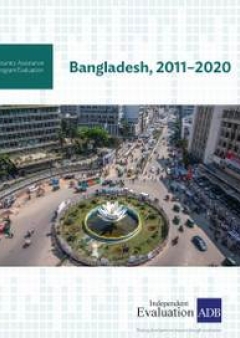
Country Assistance Program Evaluation for Bangladesh
Bangladesh is celebrating 50 years of independence. Over this period, impressive development targets have been reached and, before the coronavirus disease (COVID-19) pandemic, Bangladesh was recording the highest rates of growth in its economic history and the highest in South Asia. The economy grew by 8.2% in 2019 and, until the pandemic, by a similar level in 2020. The high levels of poverty that Bangladesh experienced 50 years ago have fallen consistently over the last 3 decades.
Yet Bangladesh still faces daunting development challenges. Climate change poses a major threat, with sea level rise, droughts, floods, and cyclones affecting much of the country’s low-lying coastal areas and its dense population. The economy requires further diversification, with foreign exchange mostly generated by ready-made garment exports and remittances from overseas workers. Inadequate infrastructure deters the higher levels of private investment needed to sustain growth and poverty reduction. Domestic resource mobilization is one of the lowest in the world, restricting needed public investment in essential services, health, education, and operation and maintenance. While Bangladesh has made good progress in closing its wide gender gaps, women face significant development challenges. In recent years, Bangladesh has also had to provide humanitarian assistance for the largest population of displaced people in the world near its border with Myanmar.
This evaluation assesses Asian Development Bank (ADB) support for Bangladesh over 2011–2020. ADB is a key partner in infrastructure development, has provided long-term support in vital infrastructure sectors, and has achieved notable results. For instance, after 50 years of consistent support for the energy sector, access to electricity has skyrocketed. Good progress has also been made in the delivery of primary and early childhood education, with high enrollments and a notable reduction in gender inequities. Challenges remain in public sector management, transforming the financial sector, growing the private sector, and improving the quality of education; each of these will require continued engagement by ADB, as will supporting efforts to adapt to climate change. Dealing with the impact of the COVID-19 pandemic is likely to be another significant test, aggravated by the fact that ADB’s health sector support has been limited over the last few decades.
In future, Bangladesh will require strong support for economic recovery as well as immediate assistance to finance COVID-19 vaccination delivery and logistics. Investment over the short- to medium-term will need to pay special attention to recovery from the pandemic and aim to strengthen national health care services and social protection systems to build Bangladesh’s resilience to shocks. Climate change considerations will need to underpin all future investment choices. This report was discussed with key Bangladesh authorities and benefitted from their feedback.
